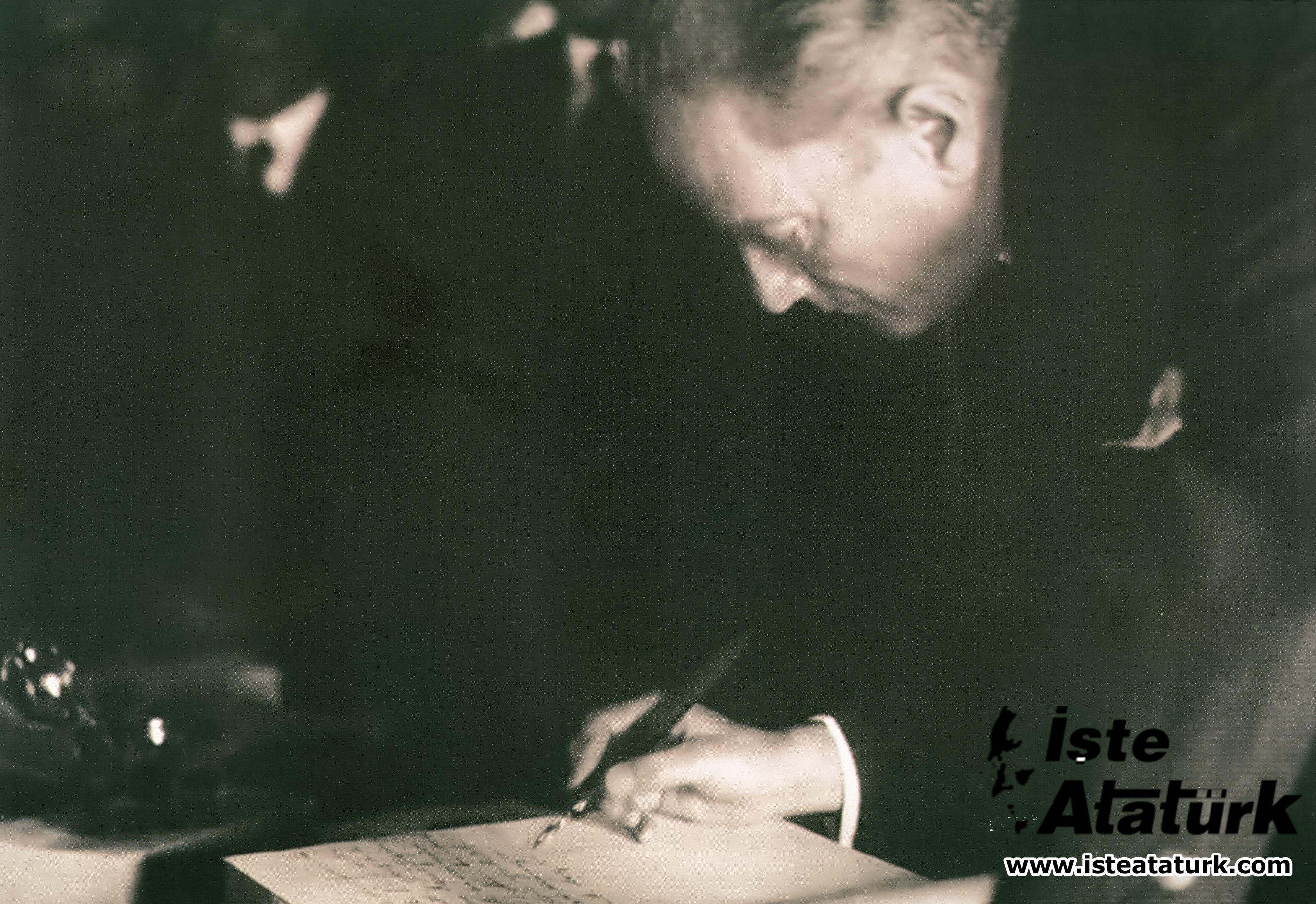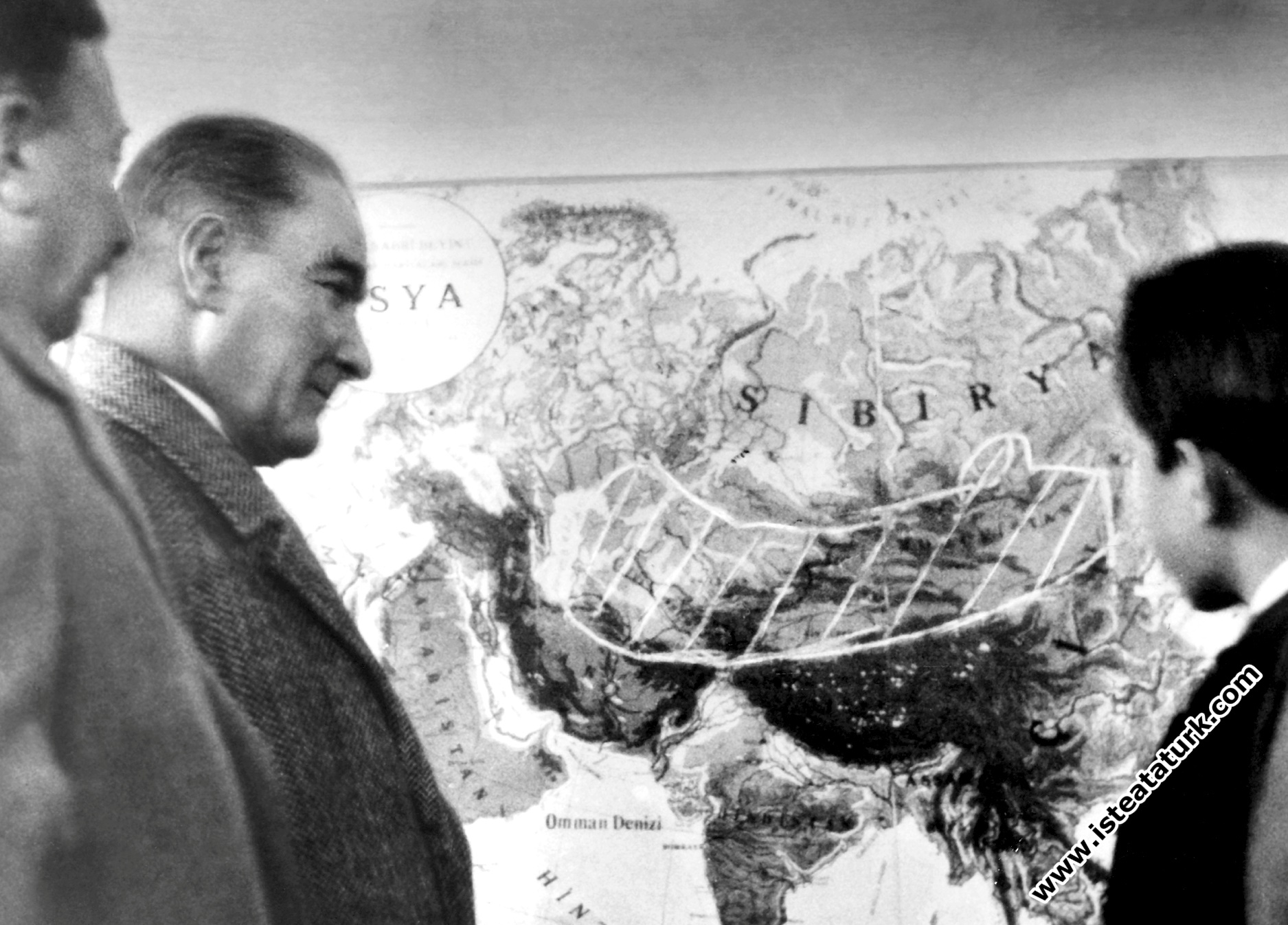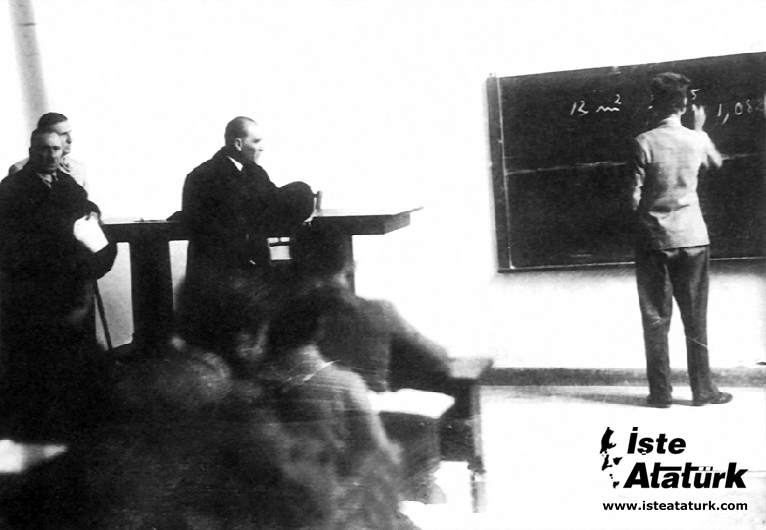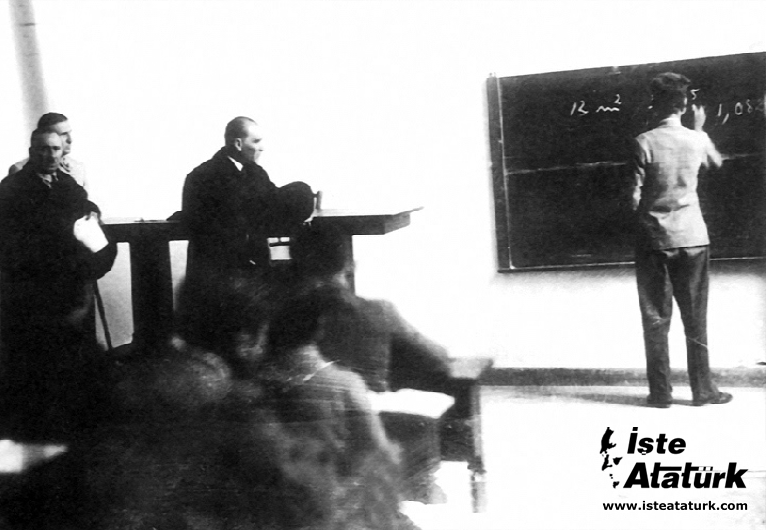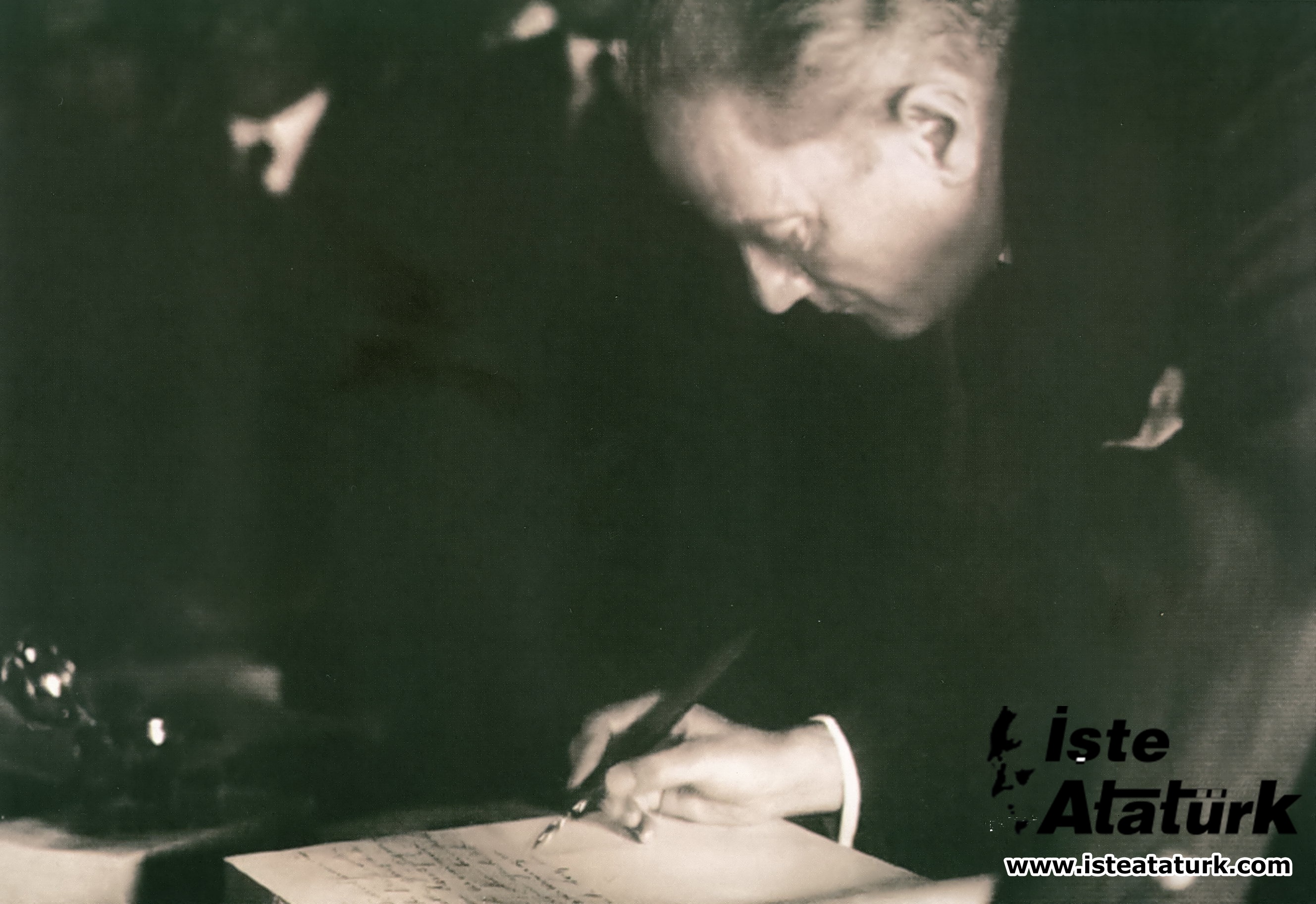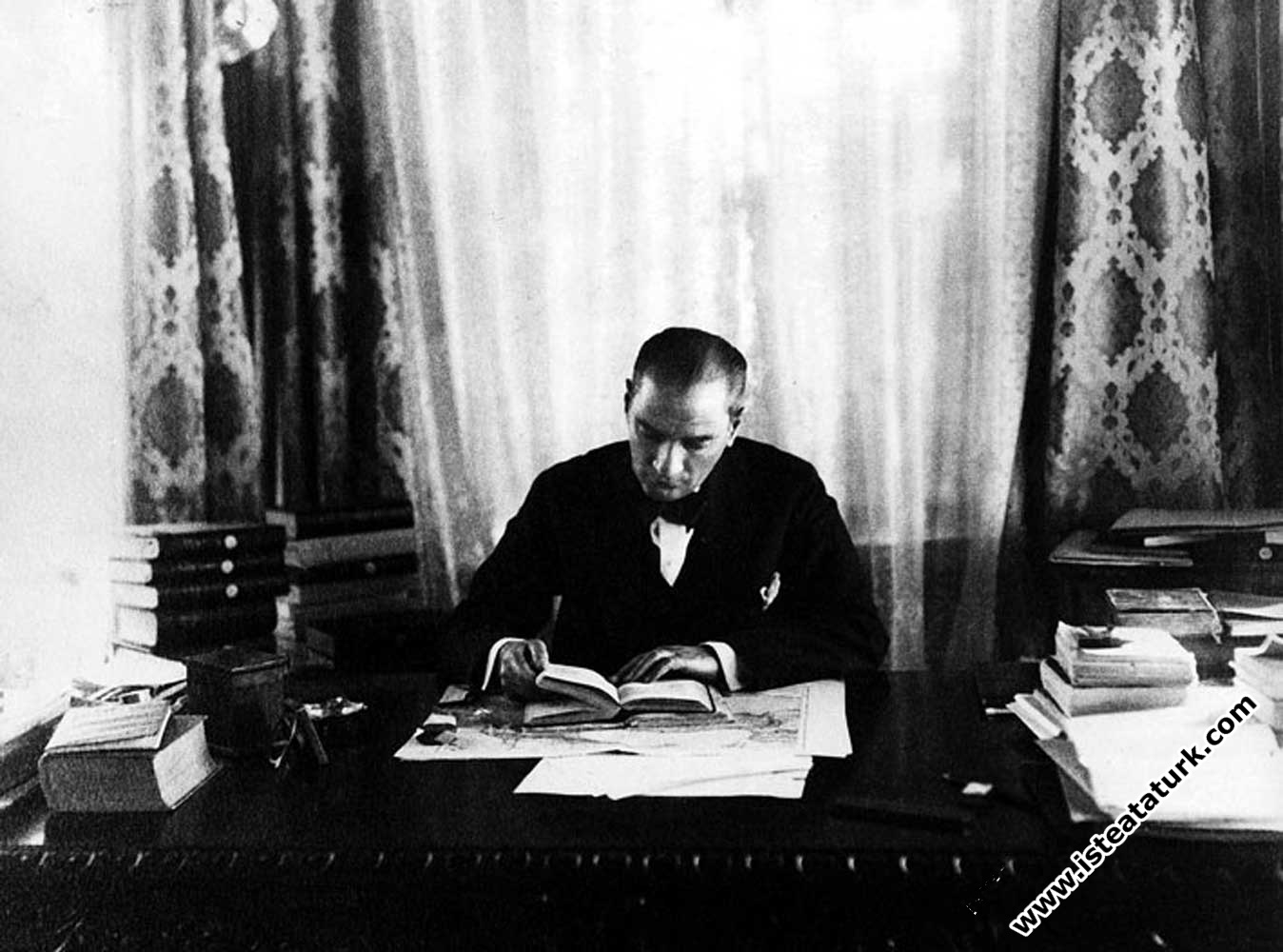
Atatürk and Colonialism (Imperialism)
Character Size
".... The forgotten great civility and great civilized ability of Turkishness will rise like a new sun on the high civilization horizon of horse with its further development." Mustafa Kemal Atatürk
ATATURK AND COLONIALISM (IMPERIALISM)
SUMMARY
Throughout his life of military struggle, Atatürk saw closely the suffering of the Turkish Nation and humanity due to colonialist imperialist Europe and argued that the Turkish Nation, of which he was the leader, would rise like a sun on the civilization horizon of the future, and that it would be at the service of all humanity. He also predicted that this civilization would take the place of the stinger civilization of the West, and as a result, the oppressed nations would be freed from being dependent on the colonial civilization of the West and the blessings of the world would be put at the disposal of all societies. His struggle against imperialism set an example for oppressed nations.
Struggle and war... People struggle, nations fight. One of the facts of life and history. Despite all efforts, continuous harmony between people, permanent peace between nations could not be established, and there was no conflict-free period on earth. Because the reasons that gave birth to the struggle and war could not be eliminated.
Struggles and wars are results; there are reasons behind them; Unless the causes are eliminated, the effects will flow through time.
Throughout history, wars have occurred for various reasons; such as wars arising from geography, society and state structure:
It must be admitted that geographical conditions are among the leading causes of wars. The inadequacy of land, the fact that the material means did not reach the level of efficiency to a satisfactory level for the society have gone down in history as the leading causes of wars. The imbalances between the continents, especially in terms of construction and welfare, and the fact that one continent is in financial distress and misery, while the other continent has the opportunities to lead a glamorous life has led to wars that covered history. Europe-Asia; The wars between Europe and Anatolia throughout history appear as a vivid example in this respect. When the struggles covering centuries are reviewed, important underlying reasons are encountered.
Long wars took place between Europe and Asia in the New Age. In addition, the Anatolian-Western wars have a history dating back to the Etiler. When these wars are examined in terms of cause, it is seen that conditions such as geography, life level and natural resources gain weight.
Medieval Europe was in complete ruin, both materially and spiritually; The gladiator games, which cannot be reconciled with any human emotion and understanding, the murderous decisions of the Inquisition, the massacres caused by religious and sectarian fights, the holocaust to put it simply, reveal that human rights and human love did not take place in the history of Europe. These real conditions will prepare the environment for the birth and spread of the colonialism and human exploitation system implemented by the same continent in the New Age. In addition, church oppression, scholastic philosophy, the tyranny of the lords, the hundred and thirty years' wars, the peasant revolts caused by material poverty had made Europe an uninhabitable country. In contrast, people in Asia at the same time lived in prosperity; an advanced level of thought had been reached. Middle Asia' In the Karakhanid Empire, Farabi, Ibn Sina, Yusuf Has Hacib defined freedom, revealed the principles of positive science, astronomy and medicine, and examined the structure of the public service state. In Anatolia, Mevlana talked about the roundness of the world and invited all people to his lodge, regardless of religion. Europe was able to reach these ideas only when it had access to Asian resources hundreds of years later.
It is a fact recorded in history that the main purpose of the Crusaders, who said that they set out under the leadership of the clergy, in order to save the present lands, in other words, the promised lofty lands, was to reach the level of prosperity they heard from the people and to seize the Asian resources. They had another aim: to win the Manzikert Victory in 1071 and to expel the Turks, who were advancing to the West for the second time, from Anatolia. East West; This is how the struggle for resources and markets between Anatolia and Europe begins.
Christian Europeans could not achieve the result they dreamed of from the Crusades, but they did not return empty-handed either. With the works they brought with them, they laid the foundation for the beginning of the movement that saved Europe from material and spiritual devastation.
The 25-year Asian journey of Marco Polo and the Polo Brothers, who followed the Crusades, also had a great impact on the awakening of Europe. In particular, the geographical information, compass, gunpowder and printing press brought from Asia by the aforementioned travelers enabled the opening of a new era in Europe. Thanks to geographical information, especially the compass, European sailors will sail to the oceans, they will discover many new lands together with America, they will reach India by traveling from the south of Africa, Europeans will dominate world trade thanks to these movements, which are known as geographical discoveries and geographical innovations in the history of the New Age, The source and market that will feed the industry, which constitutes the most important breakthrough of the next period, will establish the colonial order in broad terms.
The European achieved advanced development and prosperity thanks to positive science and industry. Industry arising from the transfer of positive science to life is a new production order created by non-living power such as gas, steam and electricity that replaces living power. The unlimited production opportunity thus obtained formed the basis of the wealth that brought Europe to economic and political domination; Thanks to positive science, the laws of nature have been reached, and material progress has been achieved by putting natural resources at the disposal and service of man; The raw materials obtained from the colonies and non-industrialized countries were processed in the industry and turned into products, and the wealth obtained from the sale of the products in the colonies and non-industrialized countries was transferred to Europe. This is the source of Europe's power, development and prosperity. When we go down to the root of this source, we come across Asian countries from two perspectives. The first is the knowledge that creates the industry, the second is the environment that enables the industry to function and the product to be sold; source and market.
Europe reached industry thanks to positive science, and with the power it gained from industry, it colonized the lands of Asia and Africa; Therefore, Asia and Africa have been the source and market that feeds Europe's industry. Vaccine! The most important thing is the fact that the positive science that makes Europe Europe originates from Asia, or rather from the Turkish land.
According to the great Turkish thinker Yusuf Has Hacib, man has two basic powers: Reason and knowledge. Mind is God-given. Knowledge is power acquired by man. With knowledge there is a way even to the sky.' Thus, Yusuf Has Hacib explains that man can dominate nature, and therefore the world, thanks to knowledge.
The power that enables man to create a work, a work, a product is knowledge; one realizes his dreams with it; he thinks with her again; reveals his thoughts, makes the world worth living by bringing it to a better level, and meets his needs. The New Age world, which takes place as a new era in history, is also the work of knowledge, science and positive science. Thanks to the positive science based on observation and experiment, human beings have reached the laws of nature, and by making use of natural resources, they have increased their level of life a little more every day. In broad terms, it has strengthened itself and made the world life more beautiful with the material means provided by the industry based on positive science. This is what is described as scientific innovations in the West; The source of the event is the Turkish world.
As we mentioned above, the great Turkish thinkers who revealed the positive science movement based on observation and experiment in the history of civilization are Farabi and Avicenna. Europeans learned positive science from their books and established industry by transferring it to life. In this respect, what we call Western civilization did not arise suddenly and spontaneously in Europe; It was founded on the information received from the Turkish world. For this reason, to say that the superior Western civilization is the continuation of the Eastern and Asian Turkish civilization should only be accepted as an expression of the truth. However, the aftermath is a sad period for Asia.
Although Asia was the cradle of positive science, in broad terms, civilization, it could not get rid of being the source and market of industrialized Europe, as it could not enter the industrial period, and could not see the reward of its work. Moreover, Asia was characterized by the oriental idiom used in the sense of backwardness, primitiveness and powerlessness, it was always underestimated, and therefore it was deemed obliged to serve the Europeans. The magnificent Ottoman Empire experienced the same pain.
16th century to the end of the 17th century. There was a brilliant science and art life in the Ottoman Empire as much as the beginnings. Katip Çelebi, the great thinker who developed the positive science movement initiated by Farabi and Avicenna, made a great breakthrough in the 16th century by revealing that the source of knowledge is the mind and the evil eye, in other words, observation and experiment; The acquired knowledge was transferred to the application. Hezarfen Ahmet Çelebi, who took off from the Galata Tower and crossed the Bosphorus, descended to Doğancılar Park in Üsküdar, realized the idea of flying, which is included in Turkish legends and was intended to be realized by the great Turkish scholar İsmail Cevheri in Nishapur. Lagri Hasan Çelebi took off from Sarayburnu with the missile he invented and circled the Bosphorus. He went down to the sea in front of Sinan Pasha Mansion. However, 16th century.
Decline period in the Ottoman Empire, 16th century. At the end of the day, the religious sciences, as it is called today, begin with the removal of rational sciences and positive sciences from the madrasah programs. For this reason, the flow of positive science was stopped. As a result, the industrial period could not be entered. In turn, Europe established large industry. This is how the decline of the Turkish world vis-à-vis Europe begins. There is one more reason.
In the Middle Ages, the Ottoman Empire had a small artistic life, a production life that met all the needs of the people and the army. But in the face of the developing industry in Europe, the small arts based on their vital power could not compete; The fact that the Ottoman country became the open market of Europe due to the lack of capitulation and customs protection caused the collapse of the production life; Over time, the Ottoman Empire, which lost its economic power against Europe, cost history. Atatürk's great work that created the age of rebirth in the Turkish world and in Asia begins at this point.
The Ottoman Empire was going through a period of decline when Atatürk started life as a soldier. The Europeans, who were chasing resources to feed the colony and therefore the industry, were in a race to divide the Ottoman Empire and divide it among themselves. Thus, they would both have seized the resources in the Ottoman country and would have the opportunity to reach Asian resources from the historical Silk Road. For this reason, Atatürk, who devoted himself to the ideal of saving the Turkish world, started to build his great work by fighting the Europeans.
Atatürk's life of struggle followed a three-stage course: Military struggle, political struggle, in other words, the struggle to establish a new state, the struggle to create a new civilization.
The military struggle begins in Tripoli and ends with victory in Izmir on September 9, 1922.
The year is 1911. The Italians attack Tripoli to seize a part of the Ottoman country. By participating in this war, Atatürk started the struggle against European colonialism. After that, in his military struggle, Atatürk always fought against the Europeans in Çanakkale, in the Canal Campaign, in Syria, in Palestine, and in Anatolia, apart from the Battles of Muş and Bitlis. It can be said that Atatürk is the soldier who fought the colonialists and imperialists the most in the history of the New Age. The first success of this struggle was the Çanakkale Victory.
First, in the World War II, the Allies, the British and the French attacked Çanakkale to help the Russians to collapse Germany and to end the war in a short time. When they were defeated in naval battles, they started land wars by landing on the Gallipoli peninsula. But when they couldn't get over Atatürk in Anafartalar, they left as they came, they couldn't help the Russians. So the war lasted four years. Çanakkale Victory started the decline period of colonialism.
The economic and political dominance provided by large industry caused Europe to enter an air of superiority; The world of European civilization was considered the country where the superior race and superior people lived. In contrast, Asians were despised as backward, primitive societies. European was characterized by phrases such as strong, Asian, eastern, weak and poor; his destiny was to be colonized. This idea was so accepted that the Asian, with its resources and people, could not take a counter action even though he was under the pressure of the Europeans. Çanakkale Victory completely destroyed this misconception.
In Çanakkale, the Europeans were defeated by the Turks, thus the Asians and the Easterners, and withdrew from the war; The result is this: the Asian defeated the European; then the Asian is stronger than the European; is superior. The view that the European is the superior race and the Asian is the backward race is just an illusion; it is a deception they resort to; Such was the awakening of Asia; Both the withdrawal and the long duration of the war gave birth to the spirit of struggle in Asia.
The Asian has a new faith; his destiny is not to be a colonial people, but to live free and independent, not to become a European market, to use his resources for himself with his own power. Its power is sufficient to achieve this goal.
Çanakkale Victory prepared the necessary thought and belief environment for the colonies and oppressed nations to start the war of freedom and independence. In this way, the colonies in Asia and Africa started the struggle for freedom and independence, they won the struggle and established independent states and dominated their resources. The most important thing is that the Europeans entered the period of losing their resources and markets as a result of the colonies' struggle for independence. This means the collapse of the West.
Atatürk's victory in Çanakkale changed the course of history, especially European history, by starting the process that would abolish colonialism and imperialism. Atatürk continued his struggle on this path with the War of Independence.
The Europeans could not defeat the Turkish Army on the fronts in the First World War. However, the Ottoman Empire had to ask for an armistice after its allies laid down their arms. The Europeans, the British, the French, and the Italians, who occupied Anatolia in places by taking advantage of the Armistice of Mudros, thought their centuries-old dreams had come true. They started to search for resources in Anatolia. An engineer at the British military representation in Trabzon started to examine the mines and railways around Erzurum and Sivas.2 The Americans who joined them also sent aid committees to benefit from the riches of Anatolia; Then they started looking for resources. Americans had 304 educational missionaries, 65.104 churchmen, 11 kindergartens, 337 primary schools, within the borders of the Ottoman State.
It can be seen that even during the armistice years, the Westerners tried to make Anatolia a colony. Because the purpose of the colonialist and imperialist is to obtain resources and markets, to buy raw materials, to sell products, to generate income, to earn money and to make a living, to put it simply. This is the western reality. This is the immutable policy, the immutable method applied by Europeans and Americans in their relations with all countries. However, Atatürk did not allow them to achieve the imperialists' ambitions in Anatolia. This conclusion was reached with the War of Independence.
Atatürk openly stated that the War of Independence was a struggle with the imperialists. In the speech he made in the Grand National Assembly of Turkey on December 29, 1921, he stated that the Turkish Nation has been under the pressure of the entire imperialist and capitalist world for centuries; In the same speech, he said that a year, a year and a half ago, the nation began to struggle with them, and that the imperialist forces wanted to deprive the nation of its dignity and independence. Because they did not find it appropriate to leave the unlimited natural treasures in the hands of the Turkish Nation, they wanted to break up the country and enslave the nation.4 Again, in his speech at the Grand National Assembly of Turkey on September 19, 1921, he explained that the Greeks were trying to revive the religious purpose pursued by the Crusaders hundreds of years ago.5
The fact is that the Europeans continued their struggle against Anatolia with the Crusades by turning them into colonialism and imperialism during the industrialization period; The goal has not changed: to seize the Anatolian resources! This is the reason for the occupation events that followed the First World War. By defeating the Europeans at the end of the War of Independence, Atatürk eliminated the Western colonialism towards Anatolia. Thus, after the Çanakkale Victory, Atatürk won a second victory against Western colonialism and Western imperialism. But the struggle did not end.
The second stage in Atatürk's struggle is the political struggle; The aim is to establish the people's state, a state based on the principle of service to the people.6 This is the State of the Republic of Turkey. The new state inherited an Anatolia devastated by long wars, a society whose material wealth had reached the point of extinction. For him, the new state would be a service state, it would build the country and bring prosperity to the people. This required establishing a new civilization in Anatolia. This is the third stage of the struggle. Reconstruction and prosperity were largely dependent on economic work. In this respect, Atatürk said that military victories should be completed with economic victories.
The Turkish Nation has vast resources, in Atatürk's words, unlimited natural treasures and vast lands. Europe has coveted this treasure since the Crusades. With the War of Independence, these ambitions of the Europeans were ended, the Anatolian treasury was saved from their attack, these treasures will be used for the welfare of the Turkish people and the reconstruction of Anatolia. It is necessary to understand and explain the purpose of "raising the national culture above the level of contemporary culture" in this way.
Civilization, in one sense, is a means of struggle; The whole of the material and spiritual means necessary for the protection and development of human existence and the creation of a more beautiful and happier world. Societies live and rise only with their civilizations. For this reason, they must always advance in the field of civilization.
The struggle between Europe and Anatolia stemmed from geography and history. Europe, which emulated the life and therefore civilization level of Asia in the Middle Ages, and embarked on the Crusades for this purpose, attacked Anatolia by taking advantage of its economic and political superiority and the decline of the Ottoman Empire in the New Age, however, the power of the Turkish Nation and He returned in the face of Atatürk's genius. But the purpose has not changed. For this reason, one should always be prepared and take precautions. They may want to seize Anatolia again in the future with the need for market and resources at a weak moment of the society, because they always pursue this aim because of the market and resources, they do not give up on this aim; they can come again. The only way to prevent this is to be superior to them, to be stronger than them. especially to raise it above the level of European civilization. In order to be able to live freely and independently in the face of Europe, we must prevail over them, rise to the level of a power that will defeat them and send them back when they attack. One of the branches of applying this idea is undoubtedly the field of economics.
The superiority of Europe came from positive science and industry. For this reason, after Atatürk established the new state, he focused on positive science and industrialization in the first degree. Three hundred years later, he started the era of positive science in the Turkish world, by saying in his 10th year Speech, "The torch that the Turkish Nation keeps in their hands and minds on the way of progress and civilization is positive science". In addition, priority was given to industrialization that would enable the use of the country's resources with the power of the nation in the way of development and prosperity, and many factories and industrial facilities were established with the statism system that supported private enterprise. Customs protection and implementation was introduced to ensure that industry and domestic goods are not affected by European competition. Investor, protectionist, In order to prevent money from flowing out in order to strengthen the economic life with a supportive state system, a balanced foreign trade method based on the principle of buying as much as is sold was introduced, interest and foreign exchange were brought under control. Thus, the country was raised to a strong position against Europe in the field of economy, industry and trade.
Throughout his life of military struggle, Atatürk saw closely the suffering of the Turkish Nation and humanity because of colonialist and imperialist Europe. This result was due to the historical structure of Western civilization. Because, thanks to the power he gained from industry, he brought the wealth of Anatolia, Asia and other continents to his country and achieved development and prosperity. Since his own resources and markets were not enough, he had to maintain this order. In addition, he assumed that he was superior to other continents due to the power he had reached and the dominance he had established. In addition, when he set out to get rid of the financial impossibility he experienced in the Middle Ages, he always sought profit, or simply money. For him, Western civilization is a selfish and materialistic civilization. The practices arising from these qualities, wars, The disasters created by the First and Second World Wars, especially due to colonial division, revealed the need for a new understanding of civilization. Civilization, which is the common property of humanity, should not be monopolized by only one continent, societies living on only one continent, in our case the West, but should be at the service of all humanity. Atatürk is the one who brought this view.
In his 10th anniversary speech, Atatürk said, "... The forgotten great civility and great civilized ability of Turkishness will rise like a new sun on the high civilization horizon of his horse with its further development." he said. The sun is a concept that comes from Turkish civilization. The great thinker Yusuf Has Hacip defines the sun in his immortal work Kutadgu Bilig as follows. "The sun rises and this world becomes illuminated, spreading its brightness to all people... When the sun rises, the earth gets warm. Then a thousand and one colorful flowers bloom."7 The new civilization should have these qualities and be at the service of all humanity.
Atatürk gave the good news of a civilization that will be in the service of all humanity by saying that the Turkish Nation will rise like a new sun on the civilization horizon of the future. This civilization, which we can call the solar civilization, will replace the selfish and materialistic civilization of the West. Thus, the world, especially the oppressed nations of Asia and Africa, will be freed from being dependent on the colonial imperialist civilization of the West, in other words industrial civilization, and the world's blessings will be put at the disposal of all societies; Those who sit on the resources will attain prosperity by making use of these resources with their own power.
In conclusion, I would like to state that a three-stage task awaits the Turkish people. By processing the rich resources of Anatolia with its own power, ensuring the development of the country, ensuring the welfare of the people, making it impossible for the Western colonialists and imperialists to attack Anatolia again by raising the national culture above the level of contemporary civilization, creating a new civilization that will serve all humanity with the speed it will take from its rich history, it has destroyed the earth. We must believe that the Turkish Nation has the power to save the European colonialists from the selfish and materialistic civilization of the Western imperialists and to achieve this goal. It is enough to remember the words of Atatürk. "Turkish Meal, Work, Trust".
1 Süleyman Kazmaz, Kutadgu Bilig in Terms of Law and State Administration, Turkish Folk Culture Research and Promotion Foundation Publication. Ankara 2000, p.30.
2 Haluk Selvi, National Struggle Erzurum (1918-1923), Atatürk Research Center Publication, Ankara, 2000. p. 164-203-213.
3 A.g.e., s. 164-203-213.
4 Atatürk's Speeches and Statements, Atatürk Research Center Publication, Ankara, 1987, p. 1, 159- 160.
5 A.g.e.,s. 199.
6 A.g.e., s. 1-338.
7 Yusuf Has Hacip, Translated by Reşit Rahmeti Oral, Turkish Historical Society Publication, Ankara, 1991 p. 70.
Researcher-Author Süleyman Kazmaz
Source: ATATÜRK ARAŞTIRMA MERKEZİ DERGİSİ, Sayı 57, Cilt: XIX, Kasım 2003
